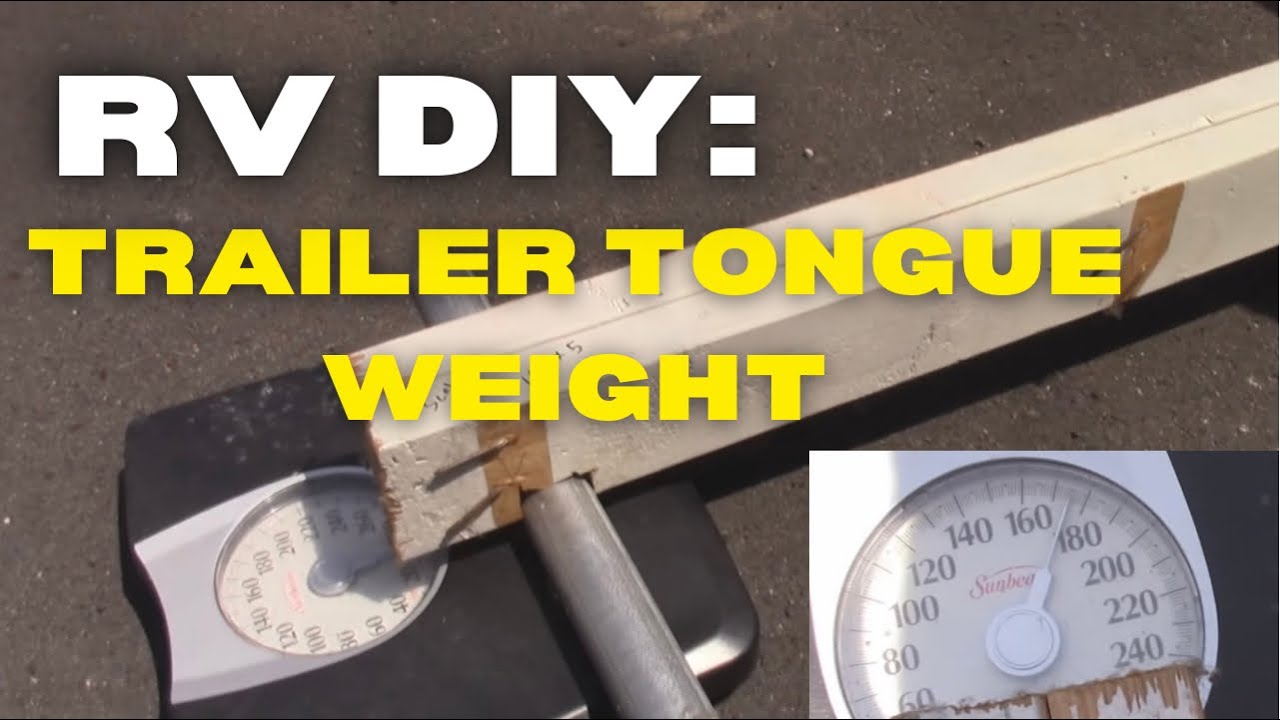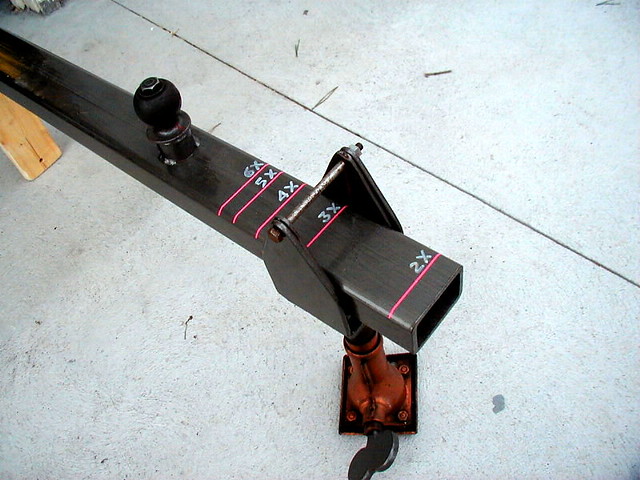The DIY trailer tongue weight scale at Harbor Freight helps accurately measure tongue weight. It is a convenient tool for safe towing.
When it comes to ensuring your trailer is properly balanced for safe towing, knowing the tongue weight is crucial. Harbor Freight offers a user-friendly DIY trailer tongue weight scale that provides accurate measurements. This tool is essential for maintaining proper weight distribution, preventing potential issues on the road, and ensuring a safe towing experience.
By using this scale, you can easily determine if your trailer is within the recommended tongue weight range, giving you peace of mind during your travels. Let’s explore how this DIY trailer tongue weight scale from Harbor Freight can benefit you and your towing needs.

- Understanding Tongue Weight Scales
- Choosing The Harbor Freight Tongue Weight Scale
- Setting Up The Harbor Freight Tongue Weight Scale
- Using The Harbor Freight Tongue Weight Scale
- Benefits Of Diy Tongue Weight Measurement
- Alternative Diy Tongue Weight Measurement Methods
- Tips For Maintaining Proper Tongue Weight
- Frequently Asked Questions On Diy Trailer Tongue Weight Scale Harbor Freight
- Conclusion
Understanding Tongue Weight Scales
Types Of Tongue Weight Scales
Tongue weight scales come in various types to suit different needs:
- Mechanical Scales: Use a simple mechanical system to measure tongue weight.
- Digital Scales: Provide precise digital readouts for accurate measurements.
How Tongue Weight Scales Work
Tongue weight scales operate based on the principle of leverage and force measurement to determine the weight exerted on the trailer hitch:
- Placement: The scale is positioned under the trailer hitch for measuring.
- Weighing Procedure: The scale calculates the downward force applied to the hitch.
- Readout: Displays the tongue weight measurement for adjustment.

Credit: www.frontenginedragsters.org
Choosing The Harbor Freight Tongue Weight Scale
Discover the convenience of the Harbor Freight Tongue Weight Scale for accurate DIY trailer weight measurements. Easy to use and budget-friendly, it ensures safe towing experiences. Ideal for DIY enthusiasts seeking precision in trailer weight distribution.
Features Of The Harbor Freight Tongue Weight Scale
When selecting the Harbor Freight Tongue Weight Scale, it’s crucial to consider its unique features. This scale is known for its accuracy and reliability in measuring tongue weight, making it a top choice for trailer owners. One standout feature of this scale is its easy-to-read LCD display which ensures users can quickly and accurately read the weight measurements. Moreover, its compact size and portability make it convenient to use anywhere, whether at home or on the road.Comparing With Other Scales
When comparing the Harbor Freight Tongue Weight Scale with other scales on the market, it stands out for its affordability without compromising on quality. Unlike other scales that may be bulky and challenging to transport, this scale’s compact design makes it user-friendly. Additionally, the Harbor Freight Tongue Weight Scale is durable and built to last, providing trailer owners with a reliable and long-lasting solution. In conclusion, the Harbor Freight Tongue Weight Scale is a top choice for those seeking an accurate, portable, and cost-effective solution for measuring tongue weight.Setting Up The Harbor Freight Tongue Weight Scale
Setting up the Harbor Freight tongue weight scale is a crucial step to ensure accurate measurements and safe towing. It is essential to follow the correct procedures to assemble and calibrate the scale, allowing you to confidently determine the tongue weight of your trailer.
Step-by-step Guide To Assembly
- Unpack the tongue weight scale from the box and ensure all components are included.
- Locate the user manual and carefully read through the assembly instructions.
- Prepare the necessary tools as indicated in the manual to aid in the assembly process.
- Begin assembling the scale according to the provided step-by-step instructions, ensuring each component is securely fitted together.
- Validate that the completed assembly aligns with the illustrations and descriptions in the manual to guarantee a solid and accurate setup.
Calibrating The Scale
- Position the tongue weight scale on a level surface, ensuring that it is stable and not subjected to any external forces.
- Refer to the user manual for specific calibration procedures and follow the recommended steps meticulously.
- Verify the accuracy of the scale by using known weights to test and adjust the calibration settings as necessary.
- Upon successful calibration, conduct a final check to confirm that the scale displays consistent and accurate measurements.

Credit: www.harborfreight.com
Using The Harbor Freight Tongue Weight Scale
When it comes to towing a trailer, it’s crucial to ensure that the tongue weight – the downward force exerted on the hitch ball – is properly distributed for safe and stable towing. One tool that can greatly assist in determining the tongue weight is the Harbor Freight Tongue Weight Scale. Here, we will discuss the proper placement of the scale on the trailer and the steps to take for accurate measurements.
Proper Placement On The Trailer
Placing the Harbor Freight Tongue Weight Scale correctly on your trailer is essential to obtain accurate measurements. Follow these steps:
- Ensure that your trailer is parked on a level surface. This will provide accurate weight readings.
- Position the scale under the trailer’s coupler, ensuring that it is centered and the scale’s platform is level.
- Make sure the scale is securely attached to the trailer using the provided straps or bolts. This will prevent any movement or instability during the weighing process.
Taking Accurate Measurements
Now that you have properly placed the Harbor Freight Tongue Weight Scale, it’s time to take accurate measurements. Follow these steps:
- Place the hitch ball on the scale’s platform and ensure it is properly seated. This will ensure a steady and reliable reading.
- Attach the trailer to your tow vehicle, ensuring that it is level and securely connected.
- Carefully take note of the weight reading on the scale. This is your tongue weight measurement.
Remember to take multiple measurements to ensure consistency and accuracy. It’s also important to note that tongue weight recommendations may vary depending on the trailer’s design, size, and load. Always refer to the manufacturer’s guidelines for the specific trailer you are using.
In conclusion, the Harbor Freight Tongue Weight Scale is an invaluable tool for anyone towing a trailer. By following the proper placement guidelines and taking accurate measurements using this scale, you can ensure safe and stable towing for your specific trailer. Don’t forget to consult the trailer’s manufacturer recommendations for appropriate tongue weight limits.
Benefits Of Diy Tongue Weight Measurement
Discover the convenience of a DIY trailer tongue weight scale from Harbor Freight. Take control of your towing experience and ensure safety on the road with accurate measurements. Easily assess and adjust weight distribution for a smoother and more secure journey.
Improving Trailer Stability
One of the significant benefits of DIY tongue weight measurement with the Harbor Freight Trailer Tongue Weight Scale is the improvement it brings to trailer stability. Proper trailer weight distribution plays a crucial role in achieving balance and stability while towing. By accurately measuring the tongue weight, you can ensure that the weight is evenly distributed between the trailer’s axles and the towing vehicle.
This balance helps to prevent the trailer from swaying or fishtailing, especially when navigating corners or encountering gusty winds on the road. Consequently, you can enjoy a smoother and more controlled towing experience, reducing the risk of accidents caused by an unstable trailer.
Enhancing Towing Safety
Another noteworthy advantage of utilizing a DIY trailer tongue weight scale, such as the one offered by Harbor Freight, is the enhancement of towing safety. By measuring the tongue weight accurately, you can ensure that it falls within the recommended range for your specific trailer and towing vehicle.
When the tongue weight exceeds the recommended limit, it may lead to an overloaded or unbalanced trailer, increasing the chances of instability, especially during sudden maneuvers or emergency braking. On the other hand, insufficient tongue weight can lead to poor weight distribution, resulting in poor handling and reduced braking performance.
By using a DIY tongue weight scale, you empower yourself to make necessary adjustments to achieve the optimal tongue weight according to your trailer and towing vehicle’s specifications. This increased control over your towing setup enhances safety, reducing the risks associated with trailer sway, poor handling, and compromised braking performance.
Alternative Diy Tongue Weight Measurement Methods
When it comes to measuring tongue weight for your trailer, it’s essential to have accurate methods at hand. While DIY tongue weight scales are a reliable option, there are alternative methods you can use to achieve the same results. These methods may be particularly useful if you don’t have access to dedicated equipment. Let’s explore two alternative DIY tongue weight measurement methods that can come in handy for trailer owners.
Calculating Tongue Weight Using Bathroom Scale
Using a standard bathroom scale is a simple and cost-effective way to measure tongue weight. Placing the scale horizontally on a stable surface and positioning the trailer coupler on the scale with the tongue jack supporting the front end will allow you to obtain a reading. Subtracting the weight of the scale from the total will provide you with the tongue weight.
Using A See-saw Method
As an alternative approach, you can employ a see-saw method to measure tongue weight. Position a board or beam on a fulcrum with the trailer coupler at one end and an object of known weight at the opposite end. By adjusting the placement of the known weight until the board is perfectly level, you can calculate the tongue weight based on the distance between the coupler and the fulcrum, as well as the weight of the known object.
Tips For Maintaining Proper Tongue Weight
Maintaining proper tongue weight for your DIY trailer is crucial for safe towing. Use the Harbor Freight trailer tongue weight scale and follow these tips to ensure balanced load distribution and better stability on the road.
Regular Monitoring And Adjustments
Regularly monitoring and adjusting tongue weight is crucial for safe towing.
Distribution Of Cargo For Balanced Weight
Properly distribute cargo to maintain balanced weight for optimal towing performance.

Credit: m.youtube.com
Frequently Asked Questions On Diy Trailer Tongue Weight Scale Harbor Freight
How Does A Trailer Tongue Weight Scale Work?
A trailer tongue weight scale works by measuring the downward force that is exerted on the vehicle’s hitch ball by the trailer’s tongue. It allows you to accurately determine the weight distribution of your trailer, ensuring safe and balanced towing.
Why Is It Important To Measure Tongue Weight For Trailers?
Measuring tongue weight is important for trailers as it ensures safe and stable towing. An improper tongue weight can lead to swaying, poor handling, and even accidents. By knowing the exact weight, you can properly distribute the load and adjust accordingly to maintain control on the road.
How Do You Use A Trailer Tongue Weight Scale?
To use a trailer tongue weight scale, simply place it under the trailer’s tongue and lower the trailer onto the scale. The scale will display the weight, allowing you to adjust the load as needed. Remember to follow the manufacturer’s instructions and check for any specific requirements for your particular scale.
Conclusion
A DIY trailer tongue weight scale from Harbor Freight can be a valuable addition to your towing setup. With this tool, you can ensure that your trailer weight is properly distributed, promoting safer and more efficient towing. By taking control of your tongue weight, you can enjoy a smoother and more secure towing experience.